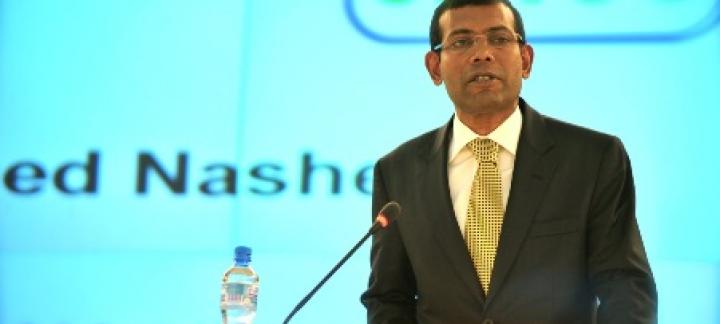13th September 2011, Geneva; H.E. Mr. Mohamed Nasheed, President of the Republic of Maldives, today delivered the keynote address at a high-level meeting of the United Nations Human Rights Council on "Peaceful Protests and the Muslim Awakening". The meeting was convened to reflect on recent human rights developments in North Africa and the Middle East. These have seen the autocratic governments in Tunisia, Egypt and Libya overthrown, challenges to the government of Syria, and the announcement of deep reforms in Morocco and Jordan. The President was invited to address the UN as someone who has been both a protester and, latterly, a President.
The President used his address before the assembled delegates of 170 countries to declare that the events of 2011 represent a defining geopolitical moment comparable to the Berlin Wall. The moment when the "balance of power swung, irreversibly, from the state to the streets".
He opened by stating that "I have been invited here today as a President, but I stand before you as a protester. I stand before you as someone who has spent much of his adult life speaking out against leaders who place their own interests over those of their people leaders who seek power for power's sake. I have led peaceful protests, and have been arrested and imprisoned for demanding change.
I therefore stand here today in solidarity with Mohamed Bou-Azizi of Tunisia, with Asmaa Mahfouz and Wael Ghonim of Egypt, with Fathi Terbil in Libya and the thousands of other people across the Muslim world who, in the space of a few months, have inspired protests that
have changed the course of history".
"These developments provide a fitting rebuttal to those, inside and outside of Islam, who claim that our religion is not compatible with democracy. The determination of protesters in Tunis, Cairo, Benghazi and Homs provide us a lens through which we can perceive the truth: that all people, no matter where they are born or which religion they follow, want the same thing - dignity and freedom".
The President went on to argue that 2011 will come to be seen, when the history books are written, as a tipping point for peaceful protests - as the moment when the balance of power swung, irreversibly, from the state to the streets. "Globalisation has wrought many changes, some positive some negative. One of the most important has been the democratization of information; the use of the internet, of Facebook, of mobile phones to break the State's stranglehold on the news media. In the past, facts and truths could be constructed and controlled by a few. Today they can be discovered and learned by everyone.
"The use of modern communication technology has allowed those with grievances to mobilize and spread their message. And, crucially, modern media also provides a lens through which the outside world can witness events unfold and learn the truth. This year's protests show, that the power of governments to control information has been broken forever".
"Today the only viable option for States is to listen to the grievances of protesters and to try to address them. This means that governments must see peaceful protest not as a threat, but as an opportunity, to start a dialogue with the people and to begin a process of reform. Such a course is, I think, unavoidable - governments simply have no choice. But it is also the enlightened course - the course of wisdom. In the globalised world, the more a government tries to control, the less control it actually has. The more those in power try to tighten their grip, the more power slips through their fingers. Today, the only way to rule sustainably is to rule with the trust and consent of the governed".
ENDS


